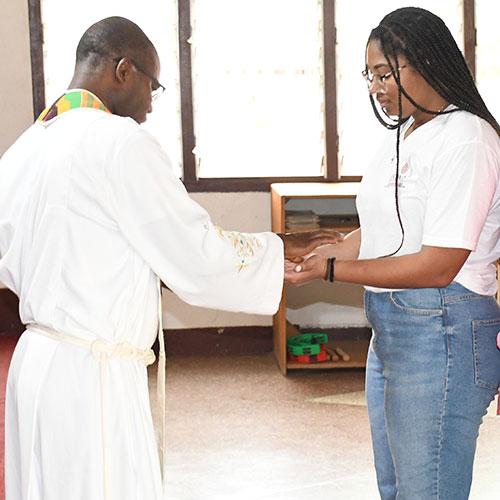Comprehensive Faculty Workload Policy
The purposes of the Comprehensive Faculty Workload Policy1 are to:
- Ensure a quality academic environment.
- Ensure equitable and fair faculty workloads.
- Ensure clarity and transparency.
- Contribute to the long term sustainability of the University.
1. Credit Hours
The standard full time instructional faculty workload is 24 undergraduate credits across the two semesters in an academic year. The standard full time instructional faculty workload at the graduate level is 18 credits in an academic year. (For those faculty teaching both undergraduate and graduate courses in a semester, see "3" below.)2
2. Contact Hours
For the purpose of the Provost and Deans equating contact hours (such as science labs) with credit hours for load purposes, a contact hour and a credit hour will be considered equivalent (unless a lab is supervised by a lab assistant).
3. Additional Instructional Activities
Faculty teaching graduate courses as part of a full load that includes some undergraduate courses will be eligible for either a standard published stipend or a three credit course remission after teaching three such graduate courses.
Faculty teaching the following: independent study courses, directing theses, and supervising credit bearing internships, which are not part of the faculty instructional load (i.e. regular courses), are eligible for a standard applicable stipend payment, as published annually.
Faculty teaching team taught courses will each be granted the full credit for the course if both (or all) faculty are present for the entire course. Otherwise, each faculty member in a two person team taught course will receive either 50% of the credits assigned for that course plus a standard published stipend or 75% of the credits assigned for that course or a course remission after teaching two such courses. Credit assignments for team taught courses with more than two faculty teaching will be assigned by the Dean in consultation with the department chair. All team taught courses must have the prior approval of the Dean.
4. Overloads
Overloads should be considered the exception not the norm. Any faculty member granted a remission (see “5” below), except those which are provided for in the governance documents of the University, should normally not be eligible to teach an overload. Overloads will be paid at the appropriate, published rate. The Deans will provide the Provost a report on overloads each semester.
5. Remissions
Remissions are normally granted for the following purposes:
- Department Remissions
Departments should be granted remissions based on a formula that accounts for the size and complexity of the department. At a minimum, the following variables should be used for the formula: administrative duties and meetings; number of full-time faculty members (disaggregated by tenure/tenure-track); number of full time equivalent adjuncts; number of majors; number of minors; and number of programs that require separate administrative activity.3
The department chair will recommend to the Dean how these remissions would be utilized (e.g. chair, assistant chair, program directors, etc.).
The formula would be calculated prior to the beginning of a department chair’s term and would remain in effect for the length of that particular term unless unusual circumstances warrant an adjustment by the Dean. The calculation would be conducted by OIEP, in consultation, as needed, with the Provost, Dean, and department chair. The Dean should file a report annually with the Provost of the distribution of departmental remissions across and within departments.4 - Research, Scholarships and Creative Work
Faculty members are expected to engage in research, scholarship, and creative works. Any faculty members engaged in a substantive academic enterprise (e.g. completing a book for a respected press; chairing a national disciplinary organization; creating a nationally commissioned creative work, guiding student research that is published or presented regionally, nationally, or internationally) that in the judgment of the Provost adds academic status to the University may be granted, on the recommendation of the department chair and Dean, a remission for that purpose and for a specified time period. Tenure track faculty will be eligible for up to two remissions in their first three years on the tenure track. The Provost will file a report with the President on academic research remissions annually. - Remissions for Special Purposes
Remissions for special purposes may be granted by the Provost after consultation with the Dean and department chair. The Provost will file a report with the President on special remissions annually.
Learn More: Full-time Faculty Remissions and Overloads
6. Class Sizes
For classes held during the academic year (Fall, Spring Semesters):
- The Dean, in consultation with the department chairs and the Provost, will publish each spring, specific class size limits for the following academic year.
- No core class will exceed 25 students.
- No undergraduate class will be larger than 40 students and no graduate class will be larger than 35 students unless a written exception is granted by the Dean. The Deans will provide the Provost a report on exceptions annually.
- Normally, no lower division class (100, 200 level courses) will be held with fewer than 10 students; no upper division class (300, 400 level courses) will be held with fewer than 7 students; and no graduate class will be held with fewer than 7 students. The Dean may grant exceptions and should consider the impact on students and the overall average class size of the department and/or the overall student credit hours of the individual faculty member. The Deans will provide the Provost a report on exceptions annually.
- Class sizes and credit hour production will be monitored by the department chairs to ensure reasonable equity of instructional workload within the department. The department chair, in consultation with the Dean, will have the responsibility of ensuring equitable instructional workloads over the course of an academic year within the department.
7. Office Hours
Each faculty member is expected to have posted office hours equivalent to no less than one hour a week per course being taught, and these office hours must normally be offered on more than one day a week.
8. Committee Service
Every faculty member is expected to provide service in various forms to the University. All forms of service are valued and encouraged. An important component of this service is University-wide committee service. The following is intended to provide guidelines for reasonable levels of committee service.
Each year every tenure-track (except those faculty in their first year on the tenure track) and tenured faculty member should be expected to “earn” at least 3 service credits. Senior faculty members should not normally earn more than 6 service credits. Service credits earned would be reported out each year as part of the faculty member’s yearly update to the Dean. Committees are categorized as A, B, or C depending upon the amount of work involved with the election/assignment. Membership on an A committee earns 3 service credits; membership on a B committee earns 2 service credits; and membership on a C committee earns 1 service credit. If a faculty member serves as chair of a committee, that provides an additional service credit of 1. If a chair of a committee believes the work of a given committee in a given academic year is much higher than usual, he or she can request an additional credit from the Provost for that committee. The following list is not exhaustive, but it does represent sample categories for service levels.
A Committees: Faculty Senate; Academic Affairs; Budget; Rank, Tenure and Awards; Search Committees for Deans, Provost, President
B Committees: Strategic Planning Committee(s); Faculty Search Committee; Library Committee; Information Technology and Computer Services; Student Affairs; Athletics; Diversity; Human Resources and Compensation; Human Subjects/Institutional Review Board; Tenure Committees; Select Ad Hoc Committees
C Committees: Advisory Committee on Assessment; Institutional Advancement; Arts Council; CELTIC; University Council; Harassment & Discrimination Committee; Harassment and Discrimination Hearing Pool; Honors Council; Study Abroad; Committee on Commencement Speakers and Honorary Degree Recipients; Catholic Intellectual Tradition; CARE Team.
Full-time faculty members are contractually obligated to attend departmental meetings and to participate actively in the work of the department. Efforts should be made to schedule the departmental meetings so that they do not interfere with class schedules of the faculty, with meetings of committees to which the faculty members have been appointed, or with outside commitments of the faculty which have been approved by the University.
Full-time faculty members are expected to serve, when appointed or elected, on departmental or school committees, on University ad hoc committees, and on standing committees of the University Council.
9. Student Advisement
Faculty members are contractually obligated to advise students throughout the year, especially during pre-registration and registration periods, and to maintain a current student advisement file. (Freshman advisors will receive a standard, published stipend.)
Knowledge of curriculum, course offerings, and degree requirements will enable faculty to be successful academic advisors. To that end, faculty are expected to acquaint themselves with the information found on-line, including the undergraduate and graduate catalogs, term course offerings, prerequisites, degree requirements, key academic calendar dates, deadlines, policies, and support services available for students.
10. Outside Activities
Faculty members are encouraged to engage in activities outside the University that increase their knowledge in the discipline and their effectiveness in the classroom. Faculty members who engage in compensated outside activities during the Iona contractual period including consulting engagements and teaching at other institutions, should disclose this in writing to the Dean. It is the responsibility of the faculty member to ensure that outside commitments do not interfere with the fulfillment of Iona responsibilities. The immediate supervision of this commitment is the responsibility of the department chair under the direction of the Dean. The Deans should file a report with the Provost of compensated outside activities annually.
11. Other
- Full-time faculty members are contractually obligated to attend fall Convocation and spring State of the University. The full-time faculty are also expected to be present at all ceremonial occasions such as commencements and special convocations. A faculty member unable to attend on any of these occasions should inform the appropriate dean well in advance.
- Faculty should provide colleague coverage for anticipated absences and for short-term illness.
- Department chairs shall monitor the number of preparations; the time needed to introduce new courses and/or on-line courses; the transition of new faculty; and shall consult with the appropriate Dean on any related workload issues and adjustments.
- All remissions and all overloads shall be entered into a central data system and should be transparent within the University. All reports cited in this Comprehensive Faculty Workload Policy shall be available to the chair of the Faculty Senate and to the chair of the University’s Academic Affairs Committee and shall be accessible to the University community.
- This policy should be reexamined at least every five years after its adoption.
1. This policy is the result of the work of the Strategic Plan Project Team for Goal 2.9c.
2. The project team recommends Iona begin a process to examine its future aspirations and the potential impact on faculty instructional workload (including 3/3; 3/4; and other variations of instructional loads), research expectations, staffing patterns, and budgetary implications, in advance of the next strategic plan that will likely be developed in the 2016-2017 academic year.
3. In their full report, the project team includes, as Addendum III, an illustration of such a formula. The final formula to be included in this policy will be developed by the Provost's Office in consultation with designated faculty leadership and OIEP and will be submitted to the governance process with a goal of implementing in the 2015-2016 academic year; no changes will be implemented to the current remissions included in the Faculty Handbook until a new policy has been approved.
4. See the project team's final report for suggestions regarding small departments (four or fewer faculty members).
- Updated February 2015


